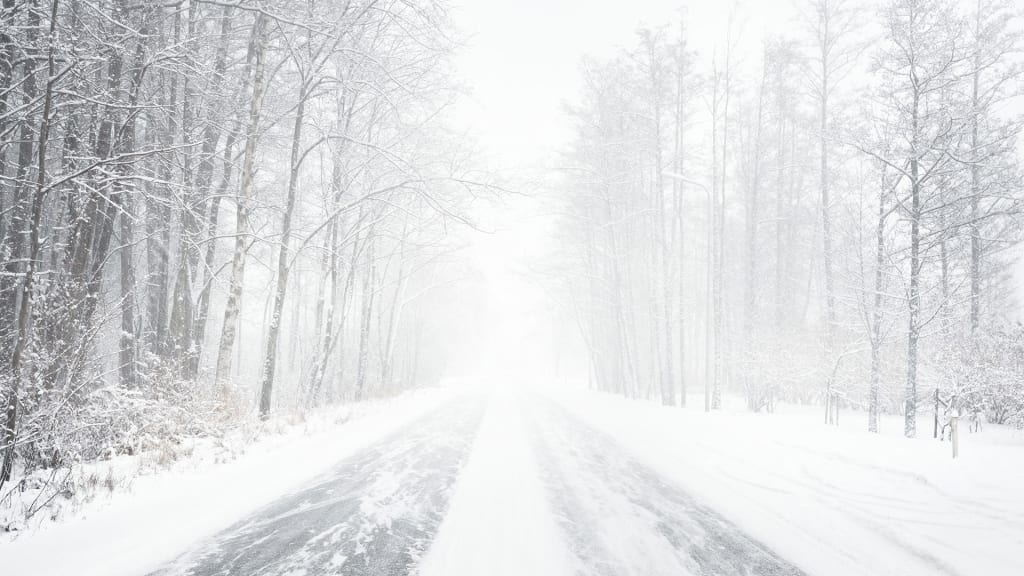Selling Ice During a Snowstorm
The sometimes hard lessons of being an indie author

I recently told a friend of mine that being an indie author sometimes feels like selling ice during a snowstorm. Everyone already has more than they need and why would they want yours?
When I finished the first draft of my first novel, "Chariots of Heaven," it was the winter of 2012. For me it was a monumental accomplishment. I'd tried several times to write a whole novel but always failed. This time, however, I wrote the entire 94,000 word book in about a month.
Once the book had been edited through several drafts, it was time to make a huge decision on what to do with it. Would I seek out the help of a literary agent in the hopes of being traditionally published? Or would I choose to self-publish? The answer back then seemed almost like a no-brainer.
Everything I read about the monumental shifts in the literary world heralded what promised to be a gold rush of self-publishing. The most outspoken advocate for self-publishing was the then newly best-selling author Hugh Howey, whose novel "Wool" was breaking through the figurative indie author glass ceiling. (You might recognize that book title as it has been recently put into film on Apple TV)
As an aspiring author his take on the shifts in the literary world were compelling, and most importantly, convincing. I decided to forgo the rigorous and often disheartening journey of querying agents and went right into publishing "Chariots of Heaven" in April of 2013.
Sales I got from the book were promising initially, but I was about to learn one of self-publishing's most frustrating lessons. Specifically, if your book doesn't trend upwards for long enough, the algorithm quickly drops it to the dark corner of the digital library where no one can find it unless they specifically look for it.
Worse still, digital self-publishing was in what I would term the wild west stage. There were no rules, no norms, and just about anything went. Which, one might guess, also meant that no one had any idea of what worked and what didn't work. Figuring out how to promote and market a self-published book in 2013 was essentially a guessing game. The most notable approach, however, was to make a book free or even perma-free in the hopes that people who downloaded it might decided to come back to buy one of your not-free works.
Since "Chariots of Heaven" was the first in a series of novels I decided to employ this approach. I made it free and saw thousands and thousands of copies be downloaded while I toiled away finishing the second novel "The Splitting of Heaven." I hoped, as anyone might, that at least a percentage of those countless thousands would return to buy the second novel. Unfortunately, that was only partially the case.
In hindsight I think it was mostly an issue with timing, a lack of building hype for the second book, and a lack of funds to advertise. I didn't make the first book free close enough in time to when the second book was published, and so while many of those who downloaded it likely enjoyed the first book, by time the second came out they'd already moved on.
At the time, however, I couldn't see that, and the minimal sales of my second book was enough to deflate my confidence to nearly nothing. I became so incredibly disheartened and convinced that it had been a waste of time. That's when I learned self-publishing's second hard lesson, don't expect to quit your day job, at least not for quite a while.
Sure, there are some people who basically hit the lottery when they publish their novel. They have the perfect combination of cover art, keywords, and genre published at just the right time that their book takes off. Meanwhile 100 other books just as compelling or well-written disappear into the void. What's the difference? I've concluded that it's about 90% luck, 10% hard work and strategy.
Overall, between my first two novels I made about a $1,000 in royalties. For some, that might be seen as pretty successful for debut, self-published works from a new author with no following. I can see that now, but the me back then couldn't take solace in that. That me wanted to escape the tedium of a career in law that I hated. Which brings me to the third hard lesson, and that is: writing should be seen as a marathon, not a sprint. I wanted writing to be my quick escape from the job I hated. Had I seen it more as a long, gradual career shift, maybe that would have ultimately come true but I never gave it a chance. Instead, I gave up writing fiction.
My dreams of being a full time author were put on a shelf with no expectation that they would be taken down again. I instead focused my time on writing a blog which garnered much more success (albeit less money) than my fiction endeavors.
Fast forward nearly a decade and I found myself overcome with a desire to pick up the pen again. My grief and disappointment in my first attempt at fiction writing had finally subsided enough for me to be brave. I had finally come to terms with the fourth hard lesson: there are few things more vulnerable than sharing your art with others and hoping they will buy it.
Not every author writes from a place of emotion, but I do. For me, my stories are deeply personal, even if vastly different from my actual life. To quote the Anna Nalick song Breath (2am), "I feel like I'm naked in front of the crowd , cause these words are my diary screaming out loud , and I know that you'll use them however you want to"
So I decided that if I was going to try my hand at writing novels, I had to be mentally and emotionally prepared to endure the vulnerability of sharing my art. I also decided that I was going to learn from those first couple lessons and alter my expectations.
After working on it for a little over a year, I finished my third novel "Dark Offerings," and was faced with the same decision from ten years earlier. Was I going to self-publish or was I going to pursue traditional publishing? This time, I elected to go with traditional publishing. I felt too scared to try self-publishing again, so I began the arduous and time consuming process of sending out query letters to literary agents. All that was left to do was wait to hear back. And that's when I learned the fifth hard lesson: you're lucky if you even get a rejection email.
That's right, out of more than a dozen agents/agencies queried I got one response in the first six months, and it was a rejection. The rest were radio silent. I knew going into this that it would likely take a while for responses to come in, but what I didn't expect was to essentially be ghosted by these agents. They have disclaimers on their websites that say "due the the high number of queries we get, we can't respond to all of them," or "if you don't hear anything in three months assume that we're not interested."
As a time-strapped professional, I understand, I really do, and at the same time how hard is it to have a stock email rejection ready to go? It takes, what, a few seconds to send one out? You could even just blind cc everyone and send them out en masse once or twice a month. Isn't that what office temps and interns are for? but I digress. The fact of the matter is that I was fortunate to get the two rejection letters in the 8 months I waited.
It was actually the second rejection letter that convinced me it was time to face my fears of self-publishing. So, after 8 months of consideration I decided to self-publish "Dark Offerings" and I'm glad I did, because for better or worse, the self-publishing landscape is very different than it was in 2013.
Which brings me to the final lesson I'm going to share in this piece and that is: it's okay to step away, to take a break, or go on sabbatical from writing. Part of my desire to write "Dark Offerings" was a need to prove to myself (not anyone else) that I could still write a full length novel. Taking all those years away from writing actually served me in the long run. It gave me time to mature in ways that were necessary if I wanted to run the marathon race of becoming successful as an indie author. It gave me a different, more balanced perspective. So if you're feeling burnt out or feeling like you're trying to sell ice during a snowstorm, it's okay to take a break for a while. Just because you take a break, doesn't mean you won't come back. And who knows, maybe it will be sunny when you do and everyone will want your ice.
There are so many more lessons I want to highlight, but as this piece is already over 1600 words, I'm going to save that for another entry. So be sure to follow me if you want to read about them. Thanks for reading! Please leave a comment or like if you enjoyed the piece. Au revoir!
About the Creator
Emma Edwins (R.T. Edwins)
Novelist, blogger, poet, and therapist.
Author of the thriller "Dark Offerings," and the "Chariots of Heaven" sci-fi series.
Author of the serial novellas "Scarlet Dreams" and "The Definitely Dead Debbie Downer."






Comments
There are no comments for this story
Be the first to respond and start the conversation.